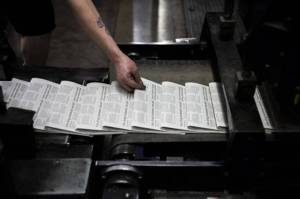Commentary: Promote health benefits of a plant-based diet
Published 1:30 am Sunday, April 9, 2017
“You should eat more fruits and vegetables as if your life depended on it, because maybe it does.” — Dr. Michael Greger, “How Not to Die”
By Michele Graves
A year ago, my mom was lying blood-spattered and shaking at the University of Washington Medical Center after a heart procedure.
Maybe you know how helpless this feels.
I was relieved but also scared, angry and frustrated. After a decade of illness, here we were again.
What could I do? How about: Take mom on a cruise.
I couldn’t fly mom to treatment at one of the nation’s best cardiovascular prevention and reversal programs: an Ornish Program, the Cleveland Clinic Wellness Institute, or the Kahn Center for Cardiac Longevity.
But I could take mom on a seven-night cruise with nutrition experts including Drs. Caldwell Esselstyn, T. Colin Campbell, Michael Klaper, Neal Barnard and Joel Kahn.
The Holistic Holiday at Sea, earlier this March in the Caribbean, was a tropical end run around a flawed medical system.
Doctors gave lectures (with continuing medical education credits available) on how to prevent and heal chronic disease including heart disease, diabetes, Alzheimer’s and cancer.
Theme: Eat a whole foods, plant-based diet.
Meta-analysis after meta-analysis (not one, but a collection of scientific studies) showed the benefits of eating vegetables, whole grains, fruits and beans.
You’ve heard it before: Eat more fruits and vegetables. But when these experts say “more,” they level it up, recommending a lot more than the typical American eats.
Try tracking whether you eat five servings of fruit and vegetables each day for a week. The latest study boosts that to 10 servings.
Dr. Esselstyn, a fellow with the American College of Cardiology says, “Coronary heart disease is a benign food-borne illness which need never exist or progress.”
This year, look for studies by Dr. T. Colin Campbell in the journal Nutrition and Cancer on preventing and reversing cancer with food.
The data, and their experience, says good food saves lives.
They recommended against meat, dairy products and processed food. Maybe you’ve seen that the World Health Organization put red meat in the same category as smoking.
Again and again, taxpayer-funded science links animal products to chronic illness. Meanwhile, taxpayer dollars fund these industries’ production — and advertising campaigns! It doesn’t make sense.
At the UW, following mom’s procedure she was given a “heart healthy” menu, which included eggs and pork medallions. Really?
Science shows that genes aren’t destiny. They’re flexible, not static (look for the latest from NASA’s Human Research Program — Are astronauts and identical twins Mark and Scott Kelly still identical?). We can affect the expression of our genes and those of our children and grandchildren.
Instead of being doomed to poor health, we can be empowered.
While a cruise is not cost-effective health care, preventive medicine is — food as medicine is — and it gives us more quality time with our loved ones (outside of sad hospital visits).
While people don’t like paying to sit in exam rooms, they may be willing to pay more for empowering services like nutrition counseling and education.
As Dr. Esselsytn noted, doctors either don’t have the latest nutritional information or the time to share it with you. But providing patients with up-to-date health information shows respect.
“How do you give a patient respect? How do you get compliance? You give a patient time,” he said. “Patients are empowered by the knowledge that they are in control of their disease.”
On the cruise I met a physician starting a plant-based education program in a small town in Oregon using Dr. Michael Greger’s book “How Not to Die” and free videos from nutritionfacts.org. I’d like to see something similar in our community and hope our medical experts will refer people to these programs.
I can’t accept family and friends being denied the opportunity to make life-saving and enhancing changes, because industries profit off continued illness, prevention isn’t funded and doctors assume we can’t make good decisions. We have a right to good information.
We deserve to make informed choices. What if there’s already a cure?
Michele Graves is a communications professional with a background in business, education and health care, works as a freelance writer in Everett.


